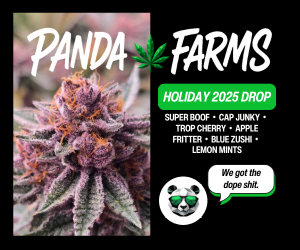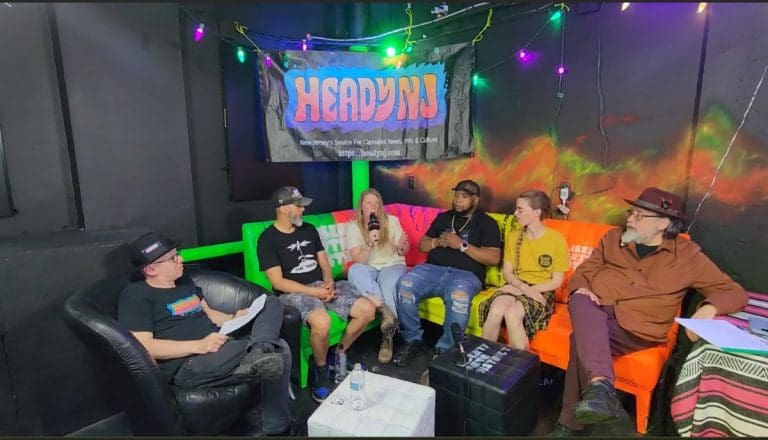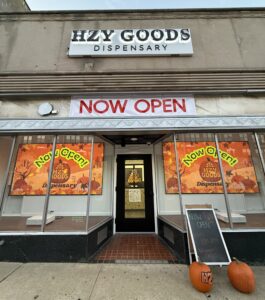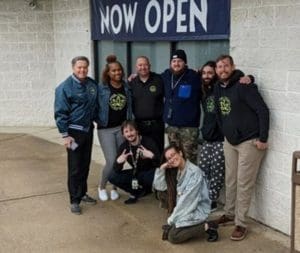Heady NJ recently held a successful Craft Cannabis Celebration in Jersey City featuring a party and a panel discussing the issue.
Table of Contents
- Panelists Introduction
- Defining Craft Cannabis
- Harvest Size Versus Quality
- Supporting Craft Cannabis
- Opposing MSO Corporate Cannabis
- Valuing Tender Plant Care
- Energy Affecting Cannabis Plants
- Organizing
- Price Versus Quality?
- Defending Premium Product Prices
- Getting Your Money’s Worth
- Cannabis Quality Issues
- Calling for a Craft Cannabis Coalition of New Jersey
- Creating a Fairly Run Organization
- Settling Definitions
- The Power of Banding Together
It was held in the JC Walls/Liberty Arts District event space in Jersey City.
The panel featured Gene Traders CEO and leading cannabis advocate Lou Pino, Lyndsey Shaw of Brighterside Farms, David Jefferson of Leaf Joint dispensary in the Heights of Jersey City in the north of the city, Baked by the River dispensary CEO Jesse Marie Villars of Lambertville, and craft cannabis attorney John D. Williams.
Mario Ramos of I Bud You and Con Bud dispensary in the Bronx introduced me.
I moderated the panel.
“So, craft cannabis has really been a big issue…,” I explained.
“True craft cannabis, of course, was not legal for decades. Some say… it’s still not legal,” I noted. “There’s a lot of innovation that does come from the underground legacy growers and home growers,” I noted.
“We have had since 2022 legal cannabis that isn’t exactly craft,” I noted.
It’s only recently that we’ve gotten newer growers.
Panelists Introduction
“So, I run around the country talking legislators, setting up, … protests, boycotts. Everything that I can possibly do to make sure that I support the craft grower,” Lou explained.
Lyndsey is a Jersey girl who went to Colorado to get into cannabis and came back. She explained they are a craft cultivation operation based in Pleasantville in South Jersey focused on living organic soil growing methods.
“We’ve been in the legal cannabis space since 2006 in Colorado, growing even longer than that,” Lyndsey noted.
“We’ve been focusing on trying to cultivate the best possible cannabis we can because … the biggest casualty in our industry has been the plant itself,” she explained.
Craft Dispensaries Featured
David noted they sell Brighterside Farms flower.
“…Our establishment has a different look from the other retailers in the area. Not so much the Apple Store look,” he explained. “There’s always an aroma of incense in the air. So, it really gives that kind of the old school feel for those of us that came up with the 70s…,” he explained.
“Our goal is to educate the consumer further,” David noted. “There’s a lot of uneducated people that purchase weed every day that just don’t know what they’re buying.”
So, he explained they emphasize training their budtenders working the dispensary floor and counter.
“The customer dictates … your menu to really be successful in this business,” he added.
Jesse explained she has been running Baked by the River in Lambertville in Hunterdon County across from New Hope, PA, since November 2023.
“We’re very proud to be a legacy to legal dispensary and work with a lot of folks who are also from the legacy market, and … some incredible craft cultivators as well,” she noted.
Jesse added they also carry Brighterside Farms.
“So, we’re proud to be able to work with our customer base and really highlight some of the best growers in this State right now,” she said. “And it’s awesome to be in this point in the regulated market.”
Jesse noted they are advocates for home grow and micro businesses as well.
John explained he has been an attorney in cannabis with craft cultivation and manufacturing clients.
“It never ends in terms of the legal challenges,” he noted.
Defining Craft Cannabis
“How do you define craft canvas?” I asked.
“The more attention you give to your plant, the better it comes out. So, if you see a gigantic room as far as the eye can see it, and you don’t see an army of individuals taking care of it. Mids,” Lou said.
Mids being mediocre weed.
“Not bad, could of tasted better, could of looked better,” he explained.
Lou noted that some mass grows are very automated.
“I seen trolleys, million square, 2,000,000 square feet, indoor area. This trolley spraying feeding tubes. And I’ve seen the same plants in organic beds,” he explained.
“The organic being a superior taste, flavor and smoke, and you see the tubes with the rock will produce more,” Lou noted.
“1st I start with quality, right? What are you actually feeding that plant? What are your farming practices? Are you doing Big Ag (Agriculture) salts? Are you having feeding tubes and rockwool and doseatron systems?” Lyndsey asked.
“…Soil-based cultivation or organic farming practice or natural farming practice, I think that for me is kind of the first definition of craft,” she explained.
“If you can infuse your soul essentially into product, I think that can really define craft as well,” Lyndsey explained. “You see that in a lot of industries, whether it be brewing, wine manufacturing, even watchmaking…”
Harvest Size Versus Quality
“As a cultivator, I’m getting probably a third, 2/3 less than what my competitors are growing right? But I sell out, and we have a small cult following,” she added.
“I also believe that there’s like a certain size you can potentially be. And I think you can’t over overextend yourself,” Lyndsey noted.
“…Product quality and product is very important,” David said.
“Price point and equality, it’s where it’s at,” he noted. “It’s just about… getting a real good quality product to the person that wants to smoke it that’s clean, that’s tested.”
David endorsed homegrow since he didn’t feel it would cut into dispensary sales.
Supporting Craft Cannabis
Jesse noted she’s been a medical cannabis patient since 2014.
“I am conscientious about what I smoke in the same way that I’m conscious about what I eat,” she explained. “So I go out of my way to find the organic farmers. I go out of my way to pay a little bit more when I know that I’m supporting a locally owned farm with really good practices.”
“So, in the same way, we try and reflect that on my dispensary shelf,” Jesse added.
“…I can go visit the people that are using organic inputs, the people that have real soil… and are using just quality practices in their space as well, and really being mindful,” she explained.
“Folks are so used to … having some of the corporate weed… As soon as you smell it, it gives you a headache. Don’t smoke that,” Jesse declared.
“There’s heart and soul. There’s a love for the planet. So there’s integrity, there’s craftsmanship,” John said. “I call you guys cannabis whispers for years, you know? Talking to the plant. And it’s fantastic! “
Opposing MSO Corporate Cannabis
“In the industry, there’s participants … I call it corporate MSOs (Multi-State Operators). And that’s the 1%. That’s hedge funds in the in the private equity. They’ll never do craft. Everything they do is a race to the bottom,” John declared. “I’m really interested in everyone else…”
“So, what’s not craft?” I asked.
“If you’re just going to bump out mids, maybe it’s fine. Everybody needs Budweiser, right? The Budweiser ends up being the number one beer. So, it doesn’t mean it’s the best. It just means that they’re selling the most of it,” Lou explained. “There’s plenty of, you know, Home Brew, IPA.”
Valuing Tender Plant Care
“Don’t be impressed by a massive facility. That’s not impressive. Those plants need care,” he declared.
Lou noted plants can have symbiotic relationships.
“I attached the lie detector test on to plants and then, … they threatened the plant. We saw the plant react… It feels our energy waves,” he explained.
Lyndsey noted that many growers work for large companies and follow basic instructions.
“They can’t actually read a plant. They’re just following a script. I tend to find that those cultivations are really not craft,” she explained.
“Our industry took a huge hit of old school, like OG growers. They got chased out. They got bought out, they got burned out,” she noted.
“So they (MSOs) need somebody that … doesn’t have experience that can follow what’s on the bottle. And, unfortunately, that’s what … 85% of the product is in our marketplace right now,” Lyndsey said.
“You would often see that the ones that come from the larger ones are the ones that doesn’t do as well…,” David noted. “So, there’s something to be said for …the person that really takes time and put their care into their growing.”
“For instance, Garden Greens was one that came to the market. When I first started ordering from them, it was like 4 strains. And now you know, you could probably consider them one of the big dogs now,” he noted. “They definitely started out with the right intent in mind. But you know, it’s been a while since I’ve smoked it to see if the quality maintains. I would assume so since they still sell.”
Energy Affecting Cannabis Plants
Jesse said they try to visit many cultivators.
“Oh my Lord, there’s such a different energy! When you walk into, like, a large corporation …none of the plants not being taken care of,” she explained. “It’s a terrible energy. You walk in, and the plants are sad.”
“They don’t have responsible practices. The cultivators … frequently … talk to me… If I could do it this way, I would. But I’m in this corporate structure. We do it this way, and I hate it.” Jesse recounted.
“Then you contrast that with a visit to one of the independent cultivators, like Brighterside, like Full Tilt Labs,” she noted. “You walk in, and it is the most beautiful, wonderful smelling, great energy… You can just tell the plants are happy.”
“When it’s not craft, they’re in it for the money. If it gets difficult, they’re going to leave, rather than pivot and they change their plan and stay in the game somehow,” John noted.
“I called it the rapids. You jump in the rapids, and you just have to stay afloat,” he added.
Organizing
“You all should be organizing in some way so you have a unified voice. So, you’re keeping the culture,” John added.
“To have a healthy industry, you have to have a diversity of viewpoints. You have to have weirdos chiming in,” John declared.
Weirdos can be visionary entrepreneurs making new things like Apple Computers.
“The industry is going to get killed by all that big money,” he declared.
I liked the business as a boat in the rapids metaphor.
“But then you keep going at it, and then you’re working the rapids, and then it’s sort of fun sometimes,” I added.
Price Versus Quality?
“So, is craft cannabis high-end cannabis? Is it possible for it to be affordable?” I asked.
“Of course,” Lou said.
He said that state taxes significantly raise the price in general.
“The smaller growers can’t afford it. Obviously, the big ones with deep pockets can. They’re planning on taking a hit for the next 5 to 10 years on purpose to drive out all the small ones,” Lou declared.
“Something that they do heavily is influencing regulations,” he said.
Defending Premium Product Prices
“Why do we think that it should be $30?” Lyndsey asked. “The other cultivators that use Big Ag products are producing 2/3 more product than me and it cost me the same.”
“It costs a lot of money, especially today with global tariffs. The cannabis market is absolutely being impacted right now by the tariffs,” she noted.
Lyndsey also felt negatively impacted by potential SEEF tax increases.
Getting Your Money’s Worth
“We tend to criticize growers for demanding a higher price for a product that they produce. And I think we need to stop trying to push craft products for MSO pricing. Because you actually cannot manufacture it for the same price,” Lyndsey explained.
She noted the expenses of legal growing contribute to a steeper price.
“If people want to buy good weed, I don’t think it’s that shocking that the weed is above $60 an eighth (of an ounce),” Lyndsey argued.
“This is the difference between top-shelf liquor and bottom,” Lou added.
“Customers are … definitely price conscious,” David noted. “So, this is where the whole education piece of it comes in.”
“Offer other options sometimes if they are …, willing to try something really more along the craft line…,” he explained. “I tell them all the time … wanna try this? This is fire (great). And you’ll be surprised how many of them try it.”
“I find that the actual longevity of the high itself, the actual quality of the high that you are taking in, it lasts much longer,” Lyndsey noted about craft flower.
“People that choose to buy craft, … it lasts them… a week and a half versus buying an 8th from another company, and they blow through it in … 48 hours,” she said. “That’s where I’ve been able to really drive home the value add when you’re selling organic-type products.”
David said some people will come back after going through lower-quality cannabis and want quality that will last longer and taste better.
Cannabis Quality Issues
As a medical cannabis patient in 2014, Jesse felt she often wasted her budget on medical flower that didn’t help.
“…I didn’t want any of my customers coming through and having that similar experience,” she explained.
“There’s a lot of forces that are pushing towards monopolization. I want my farmers to set the price because I want them to continue. This is what’s going to make the market better,” Jesse declared.
“That’s the kind of industry we need to see and that’s the thing that we need to support. And how we spend our money makes that difference, especially in these early days as this industry is expanding,” she said.
Calling for a Craft Cannabis Coalition of New Jersey
“There’s clearly commonality of interest and vision and goals and needs and obstacles. … You could facilitate where you all could succeed together,” John noted.
“So, if you wanted to do a PR campaign like “Got Milk?” you know, “Got Craft Cannabis?” he asked. “If you had a business alliance, you could all pitch in a very modest amount and be able to do that.”
“The government is for sale. Pool your money and go buy your seat at the table, right? You do that by organizing. I’ve seen it in other industries…,” John explained. “They fight negative legislation. They facilitate the industry. And there’s so many (benefits) by being organized, communications, networking, predicting what’s coming, trade practices.”
“Should we have a Craft Cannabis Coalition of New Jersey?” I asked.
Creating a Fairly Run Organization
“The second you become an organization … they fuck it up!” Lou exclaimed.
“Buy your own politician!” he declared. “Donate to their campaign. You know how cheap it is? 1000. 3000. And now every time you got an issue or concern, you call them, they pick up.”
“Now, who’s the one that’s actually doing it? The MSOs. Maybe you don’t have enough money to buy the whole State. But you maybe got … your representative,” Lou said.
“I would love like a craft growers association that talks about standards and cultivator safety,” he added.
“It has to be more of a cultural thing … It has been done because we legalized in a lot of states. And it wasn’t one organization that won,” Lou noted. “It was a combination of everybody pushing on the same message.”
“It starts by keeping it simple. And I actually created one early on with the CBD people. We created like an outline and it was meant to be simple, easy, not top-heavy,” John explained. “It is in the setup, is what’s called an incorporated unincorporated association.”
“It’s a structure where you can organize, but you don’t have it become too top-heavy, co-opted by anybody, one personality, one bit of money,” he noted.
Settling Definitions
“You also can define craft cannabis right now … to the market,” John added.
“I think about this a lot,” Lyndsey said. “If someone’s in a closet growing with really bad cultivation practices, does that make them craft? And this is where we … come to a stone wall.”
“If we can all hold on to our vision and keep the conversation going and having, sitting in meetings like this, and talks like this, I think we can keep the craft culture alive and inch towards something of an organization,” she noted.
“I think it could work,” David said. “Obviously, you gotta have like-minded people get together.
He liked the idea of being represented in the group.
“It’s something that I would want to be a part of and support in a big way. It is incredibly hard to do it in a way that’s going to actually stay to the reason that it was formed and not get corrupted by money and corrupted by bad players,” Jesse explained.
“It’s very hard to set the standards of who is part of the craft cannabis. Because everyone will want to pay top dollar part of that,” she noted.
The Power of Banding Together
Jesse noted her dispensary had an issue recently with the NJ Cannabis Regulatory Commission (NJCRC).
“We really leaned on the collective community in this state and had a lot of people … reach out to the regulators on behalf of my dispensary,” she explained.
“That’s because of you. That’s the branding, that’s the respect that they have for you…,” Lou noted
“I really appreciate it,” Jesse declared. “I would 100% come to bat for the other folks in this industry as well, who I know that are doing it right.”
Then I noted that, along with John, lawyers on the other side of the intoxicating hemp issue are also for craft cannabis and could help.
“We need everybody in it,” I said to conclude before thanking the panelists.












